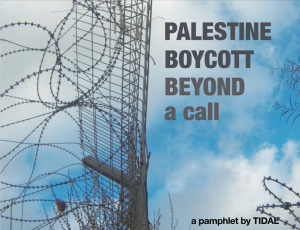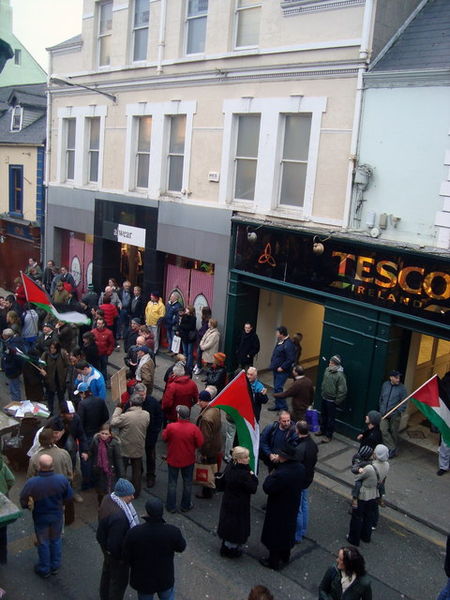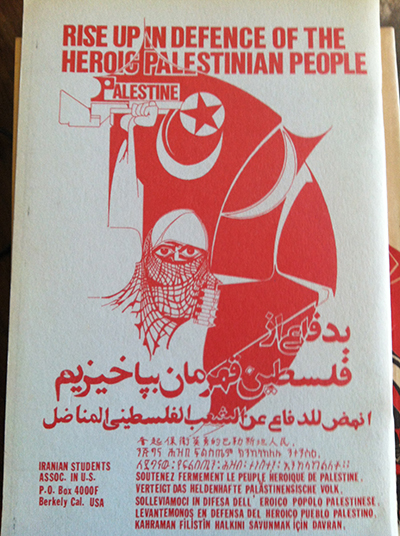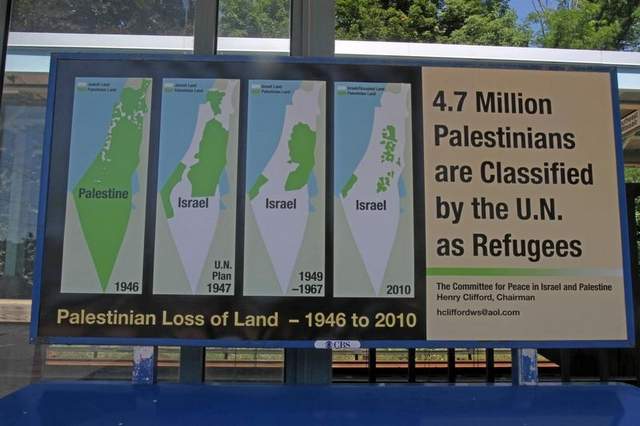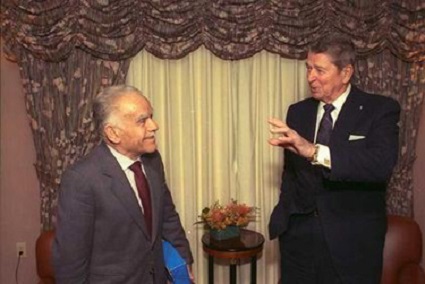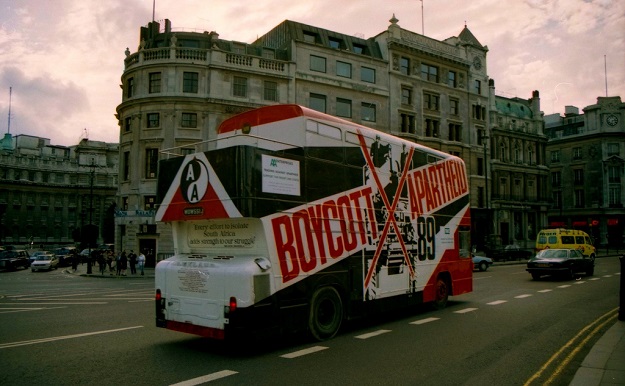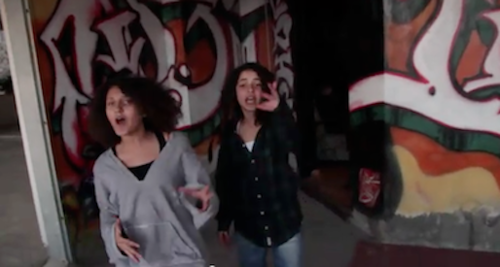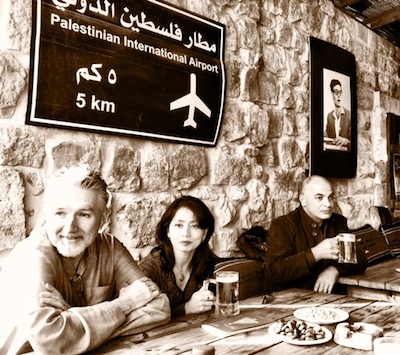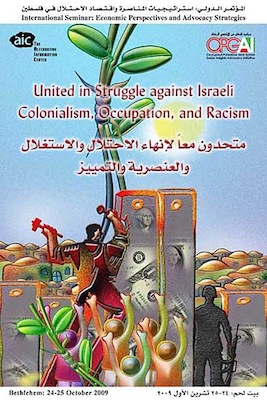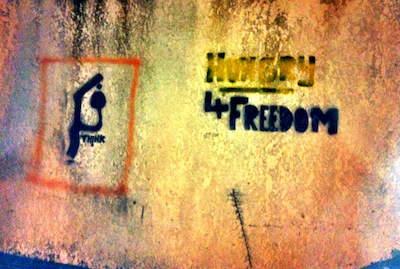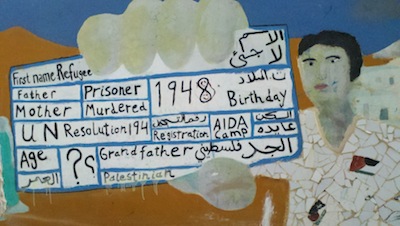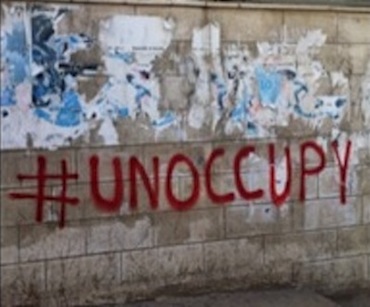The following appears reprinted from Tidal Occupy Theory. We present this pamphlet at an historic moment in the United States, and by extension the broader geopolitical order over which the United States presides. In recent months, the shackles that … Continue reading “Palestine, Boycott, and Beyond: The Time is Now”
Tag: Palestine
Historicizing Palestinian Boycott Politics
Salah HassanA boycott is a difficult and demanding political tactic. To understand the logic of boycott politics, especially in relation to the Palestinian campaign for a cultural and academic boycott of Israel, one needs to locate it within a broader … Continue reading “Historicizing Palestinian Boycott Politics”
New Directions in American Studies
Manijeh NasrabadiThe archives of Howard University’s student newspaper The Hilltop might seem an unlikely place to find evidence of a revolutionary Iranian student movement in the U.S. Yet the rowdy bunch of Iranian foreign students enrolled in the 1960s and … Continue reading “New Directions in American Studies”
Back to History and Judgment
Samera EsmeirAn important achievement of the Boycott, Divestment, and Sanctions movement has been to help render the Question of Palestine more legible by releasing it from the framework of conflict resolution that has thus far dominated the peace process, the … Continue reading “Back to History and Judgment”
Peace Dividends
Alex LubinThe U.S./Israel special relationship is at once affective, geopolitically strategic, and rooted in economics. In this essay I suggest that the neo-liberalization of the U.S. economy during the Reagan administration was tied to the formation of international free trade … Continue reading “Peace Dividends”
The Efficacy of the Palestinian BDS Movement
Riham BarghoutiOn July 9, 2005, over 170 civil society organizations signed onto the Palestinian Call for boycott, divestment, and sanctions (BDS) against Israel. The Call, grounded in a history of the use of boycott by Palestinians and inspired by the … Continue reading “The Efficacy of the Palestinian BDS Movement”
Locke Down on BDS?
Robin D. G. KelleyIlya Schapiro of the right-wing Cato Institute recently appeared on Chris Hayes’ show on MSNBC to defend Arizona bill SB 1062 that would have allowed merchants to refuse service to LGBTQ customers under the guise of “religious freedom.” Schapiro … Continue reading “Locke Down on BDS?”
Circuits of Influence
Lisa DugganAmerican Studies Association President-Elect and NYU Professor of Social and Cultural Analysis, Lisa Duggan offers background on the “virtual vitriol” that surrounded a recent NYU graduate student conference, “Circuits of Influence: U.S., Israel, Palestine.” Her post appears here in anticipation … Continue reading “Circuits of Influence”
Arab Talk Interview: Neferti Tadiar on Palestine
Social Text Collective and Neferti X. M. TadiarArab Talk recently posted an archived interview with Social Text Collective Member and Co-Editor Neferti X. M. Tadiar about her trip to Palestine in 2012, sponsored by the USACBI. You can also read Tadiar’s article “Why the Question of Palestine … Continue reading “Arab Talk Interview: Neferti Tadiar on Palestine”
Hip Hop from ’48 Palestine: Youth, Music, and the Present/Absent
Sunaina MairaThe digital material presented here is meant to supplement the article “Hip Hop from ’48 Palestine: Youth, Music, and the Present/Absent” from the current issue of Social Text (30.3, Fall 2012). An abstract for the article can be read below.
Statement of USACBI Delegation to Palestine
Neferti X. M. TadiarWe are a group of scholars and academics who teach at universities in the United States who were part of a January 2012 delegation sponsored by the US Campaign for the Academic and Cultural Boycott of Israel, which was … Continue reading “Statement of USACBI Delegation to Palestine”
The US Academic and Cultural Boycott of Israel: Unsettling Exceptionalisms
Sunaina MairaOn July 1, 2011, the US Campaign for the Academic and Cultural Boycott of Israel (USACBI), sent a letter to several scholars at US universities, inviting them to join a historic delegation to Palestine. The letter began:
Palestine Diaries
Nikhil Pal SinghWhen I told the Israeli border official who interviewed me that I was going to Ramallah, she sneered and wrinkled her brow: “Okay.” Why would anyone go there, she seemed to say. There was no mistaking her disapproval. Looking … Continue reading “Palestine Diaries”
Normalized Supremacy, Dignifying Resistance
Robin D. G. KelleyI arrived in Ramallah well prepared . . . or so I thought. I’d read Saree Makdisi’s chilling portrait of Palestinian life under occupation, historical accounts by Rashid Khalidi, Walid Khalidi, Ilan Pappe, Nur Mashala, and Gabriel Piterberg, powerful critiques of Israeli apartheid leveled by Ali Abunimah, Omar Baghouti, and Uri Davis, exposés penned by Israeli journalists Amira Hass and Gideon Levy, as well as pro-Zionist voices such as Amos Oz and A.B. Yehoshua. I had Edward Said by my side, and the Electronic Intifada and the Palestine Monitor in my web browser. Our small delegation, formed at the behest of the U.S. Academic and Cultural Boycott of Israel, consisted of some of the smartest people I know, their collective knowledge of the situation surpassed only by our hosts at Birzeit University in Ramallah. We were there on a fact-finding mission.
One Occupation
j. kehaulani kauanuiWhen reflecting on the week-long visit to Occupied Palestine and Israel – the delegation organized by the US Campaign for the Academic and Cultural Boycott of Israel (USACBI) – in some ways, the meeting that was the most provocative was with the Palestinian academics who hosted us at a public policy research center in Haifa called Mada al-Carmel: Arab Center for Applied Social Research. There we encountered critical and incisive perspectives on the academic boycott by Palestinian citizens of Israel that showed how the politics look different from their social location. Their penetrating critiques and our productive dialogue ultimately strengthened my understanding of the situation of fragmentation on the ground in Palestine, and of the need to grapple with this complexity to address what is, after all, one occupation.


